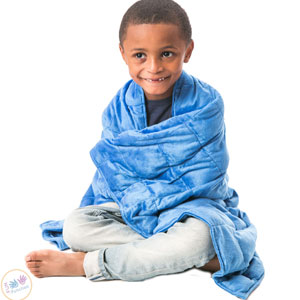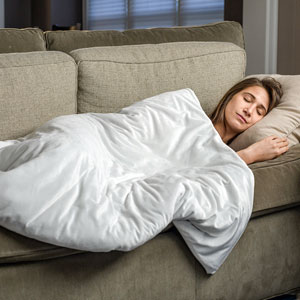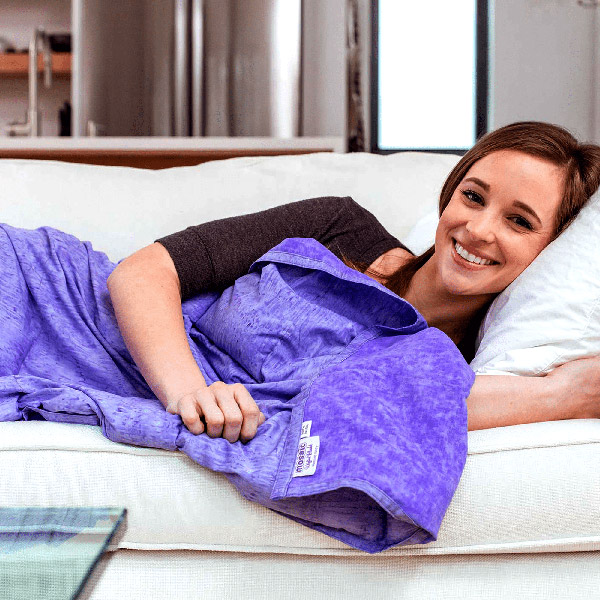Are Weighted Blankets Effective for People with Down Syndrome?
For transparency, I wanted to let you know that this page contains affiliate links. What is an affiliate link? In a nutshell, as an Amazon and Shareasale affiliate if you make a purchase after clicking a link on this site, I may receive a small commission, at absolutely no extra cost to you! Why do I have affiliate links on my site? Running a site like this and producing quality free content can be surprisingly time and resource intensive. Earning some affiliate income allows me to offset and justify the time and cost involved in producing content, paying for hosting, maintaining the site etc.
If you are considering a weighted product for yourself, a friend, family member or child: Please make sure you are well educated on the right weight to use, and whether use of a weighted product would be safe in your specific situation. If you are at all uncertain, please consult a qualified medical practitioner. Material provided on this site is for general informational purposes only and should not be considered a substitute for qualified medical advice (more info about that here).
Weighted blankets are all the rage right now, and they’re used in so many different ways. However, researchers are still trying to figure out the therapeutic benefits of such blankets, as heavy blankets have been shown to help people with anxiety disorders and autism.
But, could patients with Down syndrome relieve their symptoms too?
According to occupational therapists:
"They won't magically heal any episode straight away, but they can help alleviate the symptoms"
Albeit there are some other factors to consider before knowing if a weighted blanket is the solution you've been looking for.
Why Do I Know that Weighted Blankets Can Help People with Down Syndrome?

Well, this is my personal experience, as I grew up with a peer with Down syndrome (my neigbors were blessed with a baby boy), and I remember that he used to develop quite a temper, he could even be scary sometimes.
I remember his parents often wrapping (maybe more like hugging) him in a large and thick blanket each time their son became aggressive.
They also used to put several blankets with some books on top of him during the night. They said it helped their son sleep when he was in a grumpy mood.
Now that the heavy blankets are easily available, they use one to help their adult son with Down syndrome sleep better.
I recently suggested to them that they could also use weighted lap pads and vests during the day to tame his anger and mood changes. And they thought it was a great idea. They already know their son likes it, and that it could help him feel better.
Not all children with Down syndrome get aggressive, though. Some can get depressed, and try to hide their emotions. Not letting emotions out badly impact the nervous system, aggravating both physical and mental issues.
But before going deeper into the that, we’ll talk a bit about the syndrome, to understand the benefits a weighted blanket can bring.
What is Down Syndrome?
The chromosomal disorder, Down syndrome is a life-long condition that features both physical and cognitive impairments. From a scientific point of view, it’s an "error" in the cell division in the genetic makeup that results in an extra 21st chromosome.
I don't personally think it should be called an error, kids are a blessing, and having a kid with down syndrome can really teach you new things you didn't know about love. My neighbors know this, and I think that's a beautiful thing.
Although Down syndrome doesn’t necessarily affect the person's ability to take part in normal activities and live a fulfilled life, you’re more likely to experience a host of health issues. Not to mention that you’re more prone to anxiety, mood swings, and aggression.
What are the Symptoms of Down Syndrome?
Cognitive impairment, learning and thinking problems, are some of the major symptoms of Down syndrome. The syndrome ranges from mild to moderate and highly depends on upbringing. The most common symptoms include:
- Heart defects
- Speech impediment and language delay
- Lack of focus and short attention span
- Poor judgment, impulsivity, and aggression
- Behavioral and depression problems
Heredity and maternal age are the leading risk factors of the condition. Kids and adults with Down syndrome have a high risk of digestive issues, respiratory infections, hearing difficulties, sleep disorders, dental problems, and eye conditions. A special range of treatments help to relieve the symptoms and ward off the diseases.
What are the Treatments of Down Syndrome?
Depending on the progress of the condition, there are several treatments used to ease the symptoms of Down syndrome. Some of the widely used are:
- Speech therapy: Children and adults with Down syndrome have difficulty communicating with others. Kids may even find it hard to speak. A therapist helps them learn the sign language until they can communicate verbally. The therapy also involves learning pronunciation skills, conversation skills, reading comprehension skills, remembering words, and learning new ones.
- Physical therapy: It involves using special exercises to increase muscle strength, improve motor skills, better posture, and develop the balance. The therapy is usually used for helping kids with Down syndrome to develop properly just like other children.
- Behavioral therapy: People with Down syndrome experience behavioral difficulties. They’re more likely to have compulsive behaviors, attention disorders, and many mental health problems.
- Emotional therapy: It’s important for people, especially teens, to see a therapist to check emotional and mental health. Teens with Down syndrome can behave aggressively due to hormonal changes during adolescence.
- Occupational therapy: An occupational therapist teaches some basic self-care skills, including eating, getting dressed, writing, and doing household chores. The therapist helps to adjust to school and job as well.
- Sensory integration therapy: People with Down syndrome have tons of behavioral problems because of poorly established routine. A lack of good night’s sleep, for instance, may cause anxiety, agitation, and aggressiveness. Sensory integration therapy involves using weighted and sensory products to promote sleep and tame anxiety and tantrums.
What are the Benefits of Weighted Blankets for People with Down Syndrome?
Weighted blankets provide deep pressure stimulation that manages the body’s sensory integration. The weight of the blanket and the hug-like sensation it provides help to promote a sense of safety and security. This has a positive effect on mental health, reducing the rate of tantrums, panic attacks, and sleep issues.
The use of weighted items, such as blankets and lap pads, has been shown to alleviate mood swings that people with Down syndrome can have a few times during the hour. Mood swings lead to aggressive behavior, especially in teens.
Weighted blankets cause the positive physiological changes in the nervous system, inducing calmness and physical relaxation. They increase the serotonin level in the body, improving the mood.
Serotonin is also essential for melatonin production. Melatonin is a hormone that tells the body when it’s time to fall asleep. That’s why sleeping under a weighted quilt is an often recommended method to aid people with autism, insomnia, or as I’m suggesting here, Down syndrome.
Choosing the right blanket is highly important. Even though it’s recommended to choose a weight that's about 10% of the body weight of the person using it, people with Down syndrome may require extra weight to help them calm down their burning anger and fight their sleep disorders. Check out that article linked to for a full guide, but if you just want a quick overview, here are some very popular brands of weighted blanket:
Image | Name | Fabric | Filler | Decorations | Prices & Details |
|---|---|---|---|---|---|
Moonbow | Bamboo and polyester | Micro Glass beads | 2 colors | ||
Fun and Function | Soft Plush cotton / polyester | Polypropylene pellets | 1 color | ||
Luxome | Ultra plush minky or luxury bamboo | Glass beads (certified lead free) | Many colours available | ||
Mosaic Weighted Blankets | Cotton, minky and textured fabric choices | FDA compliant plastic pellets | Widest range of colors and patterns |
If you have a child with Down syndrome, you know the struggle. But with a proper treatment, your child can live an ordinary life that includes school, college, and work. So if you think that a weighted blanket could be helpful to him, just try. You won’t regret it!




